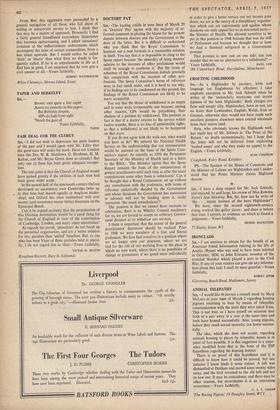DOCT'ORS' PAY
SIR,—The leading article In your issue of March 29 on 'Doctors' Pay' agrees with the majority of in- formed comment in placing the blame for the present dispute between doctors and the Government at the door of the latter. But it is difficult to understand why you think that the Royal Commission to hammer out a new formula is a reasonable solution in itself. You say that it is impossible to cling to the Spens report because 'the absurdity of tying doctors' salaries to the incomes of other professions would itself be enough to condemn it.' But the terms of reference of the Royal Commission include precisely this comparison with the incomes of other pro- fessions. The Spens Committee's terms of reference were in fact much wider, and it is hard to see why, if its findings are to be condemned on this ground, the findings of the Royal Commission are likely to be more acceptable.
You say that the threat of withdrawal is an empty and in some ways irresponsible one because, among other reasons, ' GPs would be prejudicing their chances of a pension by withdrawal. The position in fact is that if a doctor returns to the service within twelve months, there is no loss of pensionable rights, so that a withdrawal is not likely to be hampered on that score.
If you do not agree with the walk-out, what would you have us do? We entered the National Health Service on the understanding that our remuneration would be assessed on the basis of the Spens Com- mittee's report. As recently as 1950 the Permanent Secretary of the Ministry of Health said in a letter to the BMA: 'The Minister agrees that the Spens Report remains the basis of the remuneration of general practitioners until such time as after the usual consultations some other basis is substituted.' Can it be thought that a Royal Commission, set up without any consultation with the profession, with terms of reference unilaterally decided by the Government and whose decisions the Government has announced in advance will not be binding upon it, really represents 'the usual consultations'?
The position is that we cannot have recourse to arbitration, there is no Whitley Council machinery for us, we are forced to accept an arbitrary Govern- ment decision or 'to withdraw our services.
I think it important that the extent of the general practitioners' discontent should be realised. Prior to 1948 we were members of a free and liberal profession. We flow find ourselves in a position where we no longer own our practices, where we are tied for the rest of our working lives to the place in which we now work, where therd is no possibility of change or promotion; if we 'spend more individually in order to give a better service our net income goes down; we are at the mercy of a disciplinary organisa- tion which can act capriciously and against whose decisions our only appeal lies to an interested party— the Minister of Health. We allowed ourselves to be put in this position in 1948 because that was the will of Parliament and because we thought that at least we had a financial safeguard in a Government promise.
That promise is now cast on one side; can you wonder that we see no alternative to a withdrawal?—
Yours faithfully, BASIL LEE 186 Canterbury Road, Davyhulme, Manchester












































 Previous page
Previous page